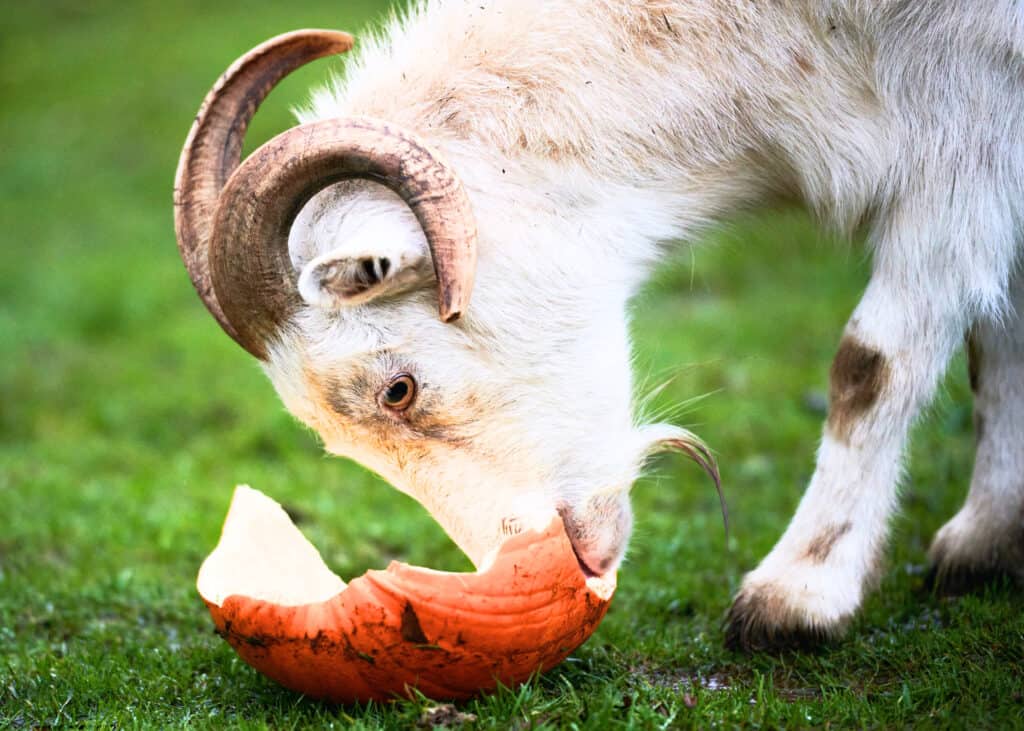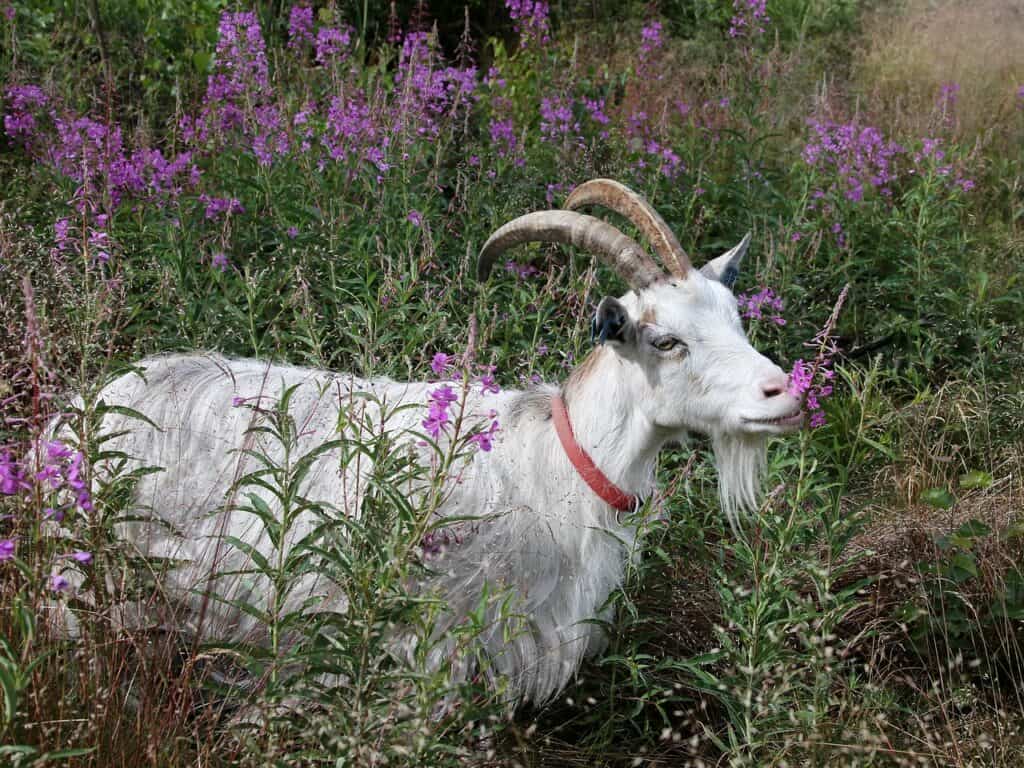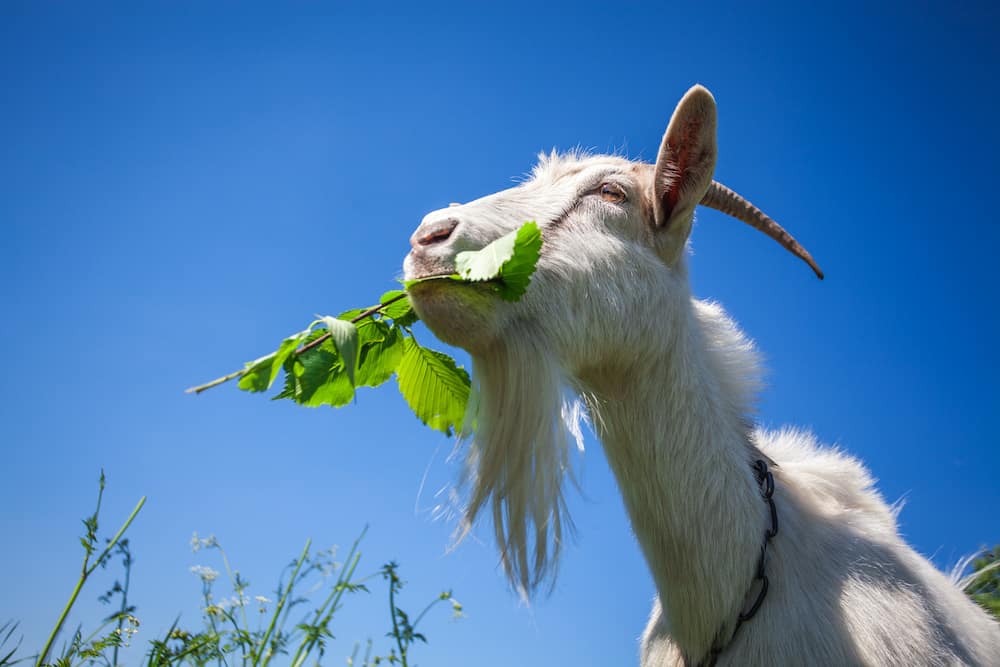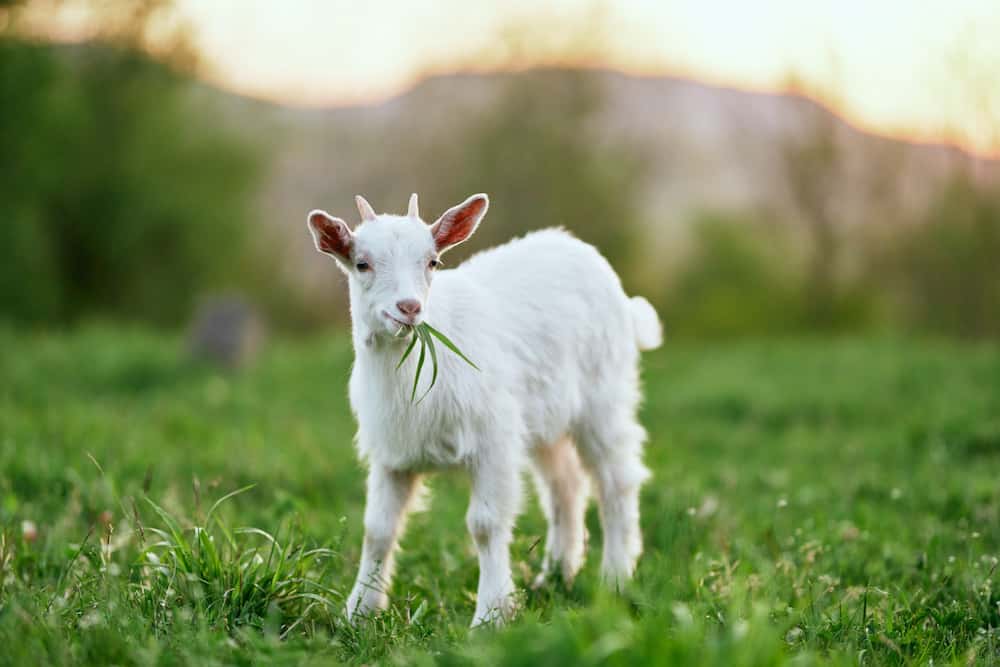Before buying goats, you need to know: What do goats eat? Fortunately, they are one of the least picky ruminants that you can have on your farm, although they do require a balanced diet, just like humans do.
Goats are known to eat anything and everything. Still, as their owner, it is your responsibility to ensure they are consuming enough proteins, vitamins, and minerals depending on their age, breed, and size. You want to be sure when they are out browsing and foraging that they don’t eat any vegetation sprayed with insecticides.
Learn the best tips for feeding your goats as well as what to feed them to ensure they grow up to be healthy, productive animals.
What Do Goats Eat?
When you start buying feed for your goats, you’ll undoubtedly want to consider what they like to eat, as some owners find their animals will eat relatively anything. In contrast, others note that their goats are particularly picky eaters.
Often, you might have to try different types of food to figure out what ingredients will not only satiate your goats but also entice them to establish healthy eating patterns.
There are a multitude of things that you can feed goats. There are five essential nutrients goats need: water, energy (fat and carbohydrates), protein, minerals, and vitamins. A deficiency in any of these can cause illness, poor performance or growth, and even death.
Whether you’re looking for variety or if you want a more economical version to lessen your operating costs, choose from the following.
Hay
One of the most important things to have on your farm for any animal is hay. It is an essential resource that can also be a substantial source of nutrition for your goats, especially if they don’t tend to forage.
The distribution of hay will depend on the size of your property and whether you can set up a pasture for your new animals. Goats are fabulous grazers and might not require hay if they can forage throughout the year.
If you live in an area with changing seasons, with snow in the winter for example, this will prevent your goats from grazing. Therefore, you will want to invest in a substantial amount of hay.
Although there are many different types of hay, the essential thing to think about is the quality of what you’re feeding your goat compared to the specific version.
On average, goats require up to 14% crude protein and up to 65% TDN to maintain a healthy amount of microbes. These microbes make their meat and dairy safe for humans to ingest, so ensure you take the time to find the highest quality hay in your area.
Chaffhaye
Hay is the foundation of your goat’s diet if they aren’t able to forage. However, it’s also not filled with the essential vitamins and minerals they require to thrive. This is where Chaffhaye comes into play. Made from premature grass or alfalfa, depending on the type you find, this feed is combined with molasses.
It is then vacuum-sealed in a container, bag, or pouch to enable the production of healthy bacteria.
As the Chaffhaye begins to ferment, bacteria will grow in more substantial quantities. This helps to make your goat’s hay substantially easier on their stomach.
What’s more, it provides goats with an assortment of minerals and nutrients that their bodies will convert into energy.
Considering one of the most vital parts of owning goats is to ensure their digestive health, Chaffhaye is a fantastic option for maintaining their gut health with healthy bacteria.
Feeding Grain to Goats
Another essential part of a goat’s diet is grain. Feeding grain comes in many different forms and is one of the more affordable types of goat feed. If you’re asking, what do goats like to eat, feeding grain is often seen as a delicious and sweet treat. It also nourishes their digestive system and helps you to add more bulk to their meals.
You’ll find that most grains have an assortment of minerals and vitamins, as well as protein, that you can combine with hay to make their food far more nutritious. This is especially true if you can find grains that are specially formulated for goats.
There are four main types of feeding grain that you can find:
Whole Grain
This feed is unprocessed and will be available in an entire seed that your goats will love to chew. Whole grain feeding has several advantages. It can improve growth rate and feed efficiency.
Pelleted Grain
Most often, the pelleted grain is made from grain by-products that are cut into smaller pieces and bound together using a binding agent.
Rolled Grain
You’ll find rolled grain is quite similar in nutrition as whole grain, but instead of having pellets or rounded pieces, it is made flat.
Texturized Grain
If you need a type of feed with added ingredients for better nutrition, texturized grain is a fantastic option. You can easily combine it with other types of feed too. Learn what to feed goats to gain weight.

Kitchen Scraps for Goats
Even though it might seem easy enough to give your goats all of your kitchen scraps instead of putting them in the compost, you will want to establish a well-rounded diet of other ingredients apart from human food.
Goats will adore kitchen scraps as treats. However, they should always be combined with other goat-friendly ingredients, such as Chaffhaye, hay, or grain feed. Mostly anything you would put into your compost will be sufficient for your goats, including tomatoes, orange peels, vegetable skins, and fruit skins.
There are a few ingredients that your goats can’t eat, such as eggshells and fish cuttings.

Browsing, Grazing, and Foraging
Goats are browsers. Ideally, every goat farm should have enough area for the goats to browse throughout most seasons. This is why you will want to consider developing a pasture. Not only is this a more cost-effective way to make sure your goats are maintaining a healthy diet, but it can also be far more convenient and time-saving.
With a perfectly designed pasture, your goats can eat food freely instead of having to wait for specific feeding times. You can also use other ingredients as supplementary types of feed.
When developing your pasture, you’ll want to focus primarily on natural foods that are highly digestible and tasty to your goats. Otherwise, they aren’t likely to eat anything.
Sudanese and Bahia grasses are a fantastic option as well as clover, sorghum, millet, and grain grass. They not only boost your goat’s health but also grow quite well over the years.
One of the most substantial benefits to having a well-established pasture is that as your goats eat, their digestive systems will become less prone to internal parasites and gastrointestinal diseases.
Certain goat breeds, such as Kiko goats, are low maintenance and are excellent foragers. Likewise, a Toggenburg goat will rely less on supplemental feeding, resulting in a good ROI.
What Nutrients Do Goats Need?
Aside from asking what do goats like to eat, you should also find out their nutrient requirements. Just like any other animal you have on your farm, goats require proper nutrition to stay healthy and to live as long as possible.
There is an assortment of nutrients that they will need from their food, which is why opting for feed designed explicitly for goats is your best option. Also, it’s important to consider special circumstances. As example, a pregnant or nursing doe will have different dietary needs than a buck.
In general, you will want to ensure they’re consuming enough calcium, salt, and phosphorus daily in terms of minerals with the addition of Vitamin A, D, and E.
How to know if goats have the right nutrition
Signs of a good diet and the proper nutrition for goats include:
- Rapid growth
- High reproductive success
- Normal manure
- Good body condition
- High milk production
- Alert behavior
Goats that are hungry or unsatisfied will eat continuously. They won’t chew cud, play, or rest.
What Not to Feed Goats
Now that you have a clear idea of the best ingredients you can use to develop a healthier diet for your animals, it’s time to consider what not to feed goats.
It’s common to hear that these animals will eat anything, and in most cases, they will. This can also be incredibly hazardous to their health.
Be aware of areas on your property that may have been sprayed with insecticide or herbicides. Watch for trash and other discards. Some farm owners have suggested their goats might even be attracted to cigarette butts, which can be very toxic and dangerous.
Not only will you want to make sure you regularly inspect their pasture for harmful items, but you should also pay close attention to the food they are given.
Also, there are certain types of feed for other animals that should be avoided, as goats have sensitive digestive tracts that are prone to damage. Some of the most important things to keep out of your goat’s food include:
- Kale
- Holly trees and bushes
- Avocado
- Azaleas
- Milkweed
- Wild cherries
- Peach and palm leaves
- Nightshade vegetables
- Rhubarb leaves
- Chocolate
- Meat
- Dairy
- Crotalaria
- Egg shells
- Dog food
- Cat food
Other things you shouldn’t feed goats include:
Dairy and Meat Products
Interestingly enough, goats are herbivores with a digestive system that is specifically designed to take advantage of cellulose within plants. In most cases, goats will stray away from meat and dairy products as it is in their nature not to be carnivorous.
However, if given the opportunity, they might nibble on meat, which can be harmful to their health. With a digestive system that is designed quite differently from carnivores and omnivores, goats are prone to severe health issues if they are ever fed meat or dairy, frequently leading to death.
This is why you should never feed your goats dog or cat food, as both will contain meat products or by-products that would internally damage your animals.

Non-Food Ingredients
As earlier mentioned, goats are naturally curious creatures. Hence, they are likely to nibble on items that might not even be classified as food, such as paper or cigarette butts.
The main reason as to why you should always inspect your goat’s enclosure and feed for non-food items is that these components can contain toxic chemicals, such as the ink used to print on paper, that could destroy their internal system.
It might seem like common sense, but there have been cases where goats have died as a result of being exposed to non-food household trash items in their food.
Poisonous Plants
When you establish pasture for your goats, you might assume that only the items you plant will be what grows in the area.
However, they can be exposed to other plants that make their way in. For example, yew, azalea, and rhododendron could be growing in the pasture unbeknownst to you. These are highly toxic plants that have a high likelihood of putting your goats at extreme risk.
While inspecting their browsing and grazing area for non-food items, take note of the plant life that they might have access to, as well, ensuring that you remove them as quickly as possible.
Should your goats become exposed to toxic plants, be sure to contact an emergency veterinarian.
Food Supplements for Goats
Many first-time goat owners wonder if supplements are on the list of what can goats not eat when in reality, they are a fantastic addition to their diet. Similar to other animals, supplements are specifically designed to ensure your goats receive all of their essential vitamins and minerals.
You’ll find the majority of supplements are designed to be incredibly delicious while packed with nutrients. As such, your goats will love eating them regularly or as a treat at the end of the week.
Loose Minerals
Loose minerals are a multivitamin for goats. They typically contain a substantial amount of minerals and vitamins which will aid in goats’ digestive health.
You should be able to find them in blocks in which goats can lick over time. You can also buy them as loose powders or granules you can add to their food. The ingredients in loose minerals are easily fed free choice. They contain chelated minerals that are easily absorbed by the internal system of your animals and utilized effortlessly.
Black Oil Sunflower Seeds
This treat is well-known among rabbit owners because they are delicious and nutritious. Did you know that it can also be a fantastic supplement to add to your goat’s food? Black oil sunflower seeds feature an incredible amount of vitamin E, which is essential for the healthy development of muscles and reproduction in your goats.
Farm owners will also love that black oil sunflower seeds contain an ample amount of selenium, iron, and zinc for internal and external health.
Feeding goats black oil sunflower seeds is a way to supplement to enrich the fat content in your goat’s milk while ensuring their coats remain shiny and healthy. It’s one of the best supplements to use.
Apple Cider Vinegar Solution
You can easily buy pre-mixed apple cider vinegar solutions for barn animals. In addition, you can use a DIY recipe to make your own. Either way, it’s a great way to promote a healthier immune system in your goats.
Some goat breeds are particularly susceptible to diseases and illnesses, which can easily be warded off with a healthier immune system.
By adding this solution to their water daily, you’ll be increasing the total number of enzymes in their body. You’d also be adding minerals that can help them fight off the most common illnesses among goats.
Tips for Feeding Goats
Now that you know what can’t goats eat, let’s get into the details of how you can help to make feeding time substantially easier. There are many fantastic tips and tricks that farm owners use to their advantage to ensure their goats are eating healthy amounts of food regularly.
Find Feeding Equipment
You don’t need to spend thousands of dollars to feed your goats, which is convenient. However, you will still need a few essentials to protect the integrity of their food. Doing so will also make feeding goats much more manageable.
Depending on how you feed your goats, you might find some of these items aren’t essential. However, they are all useful for first-time owners.
Feed Storage Containers
Do not underestimate proper feed storage containers. Having the right containers makes it easy to keep goat’s food fresh and safe from pests and mold.
Food Buckets
Food buckets can be convenient if you are hand feeding or spreading feed around the enclosure. You might also allow your goats to eat directly out of the buckets.
Water Buckets
By using a plastic bucket, you can be sure to adequately disinfect it. In this way, goats always have access to clean water.
Hay Manger
This may be the most expensive item on this list. A hay manger makes it much easier to feed your goats hay that might be mixed with other ingredients, such as alfalfa. Your goats will be able to feed themselves.
Slowly Make Diet Changes
You may find that your goats lack a specific vitamin or mineral. If you want to add a new ingredient to a goat’s diet, be sure to do so slowly.
Goats digestive tracts are sensitive. Changing their feed drastically could result in a loss of appetite, illness, and gastrointestinal discomfort.
You will want to slowly introduce any new ingredients. Feed them small-to-moderate amounts of the new food over time until the goats become used to their diet.
FAQs
Can goats eat dog food?
When asking what can goats not eat, dog food is number one on the list. It contains meat; goats are herbivores. Introducing meat-based foods, such as dog food, can cause illness and death in many cases. Manufacturers design dog food for canines who have different needs from goats.
Is bread good for goats?
Bread can be a fantastic treat for your goats. However, you should give it in moderation, just like any other treat.
Too much bread can cause bloating. It also contains carbohydrates which temporarily satiates your goats. This can make them hungrier by the end of the day.
You will also want to make sure you feed them small pieces of bread rather than whole slices. This will make it easier for their bodies to digest.
Can goats eat banana peel?
Fortunately, banana peels aren’t on the list of what can’t goats eat. Yes, giving goats banana peels is a great way to make use of banana peels. Goats love to indulge in a variety of different fruit and vegetable skins.
You’ll especially love that banana peels aren’t an empty ingredient to add to their feed. In fact, they provide an essential amount of protein to help supplement their existing diet.
What vegetables can goats eat?
Goats can eat an assortment of vegetables, though their favorites are tomatoes, lettuce, spinach, celery, and carrots.
Is feeding meat goats expensive?
It’s important to know that profitable meat goat production requires high quality forage and browse as well as concentrate feeds.
Meat goats do not fatten like sheep or cattle. This means their rates of weight gain are smaller, ranging from 0.1 to 0.8 lb/day. Feeding is often the most expensive part when raising goats for meat. It’s important to allow them to graze whenever possible for optimum nutrients.
Can goats eat apples?
Yes, goats can eat apples in moderation. They can eat apple cores and apple seeds as well. Goats can eat the whole apple. However, I cut the apple into small, manageable pieces. I also remove the seeds and core before feeding them.
Can goats eat grapes?
Yes, goats can eat grapes. No need to cut them; they can have both the flesh and the seeds.
Can goats eat bananas?
Yes, goats can eat bananas. No need to cut them; they can consume both the flesh and the peel. Goats are great for eating scraps that would otherwise end up in the landfill or compost.
Can goats eat strawberries?
Yes, goats can eat strawberries. No need to cut them; they can have the whole strawberry, including the leaves and stem.
Can goats eat pineapple?
Yes, goats can eat pineapple. It is best to remove the tough outer skin and the prickly top before feeding them the flesh.
Can goats eat blueberries?
Yes, goats can eat blueberries. They are rich in antioxidants.
Can goats eat potatoes?
Yes, goats can eat cooked potatoes but not raw potatoes. Bake or boil them before giving them to goats. Like with all vegetables, they should be considered a treat and given in moderation.
Can goats eat zucchini?
Yes, goats can eat zucchini. No need to cut it; they can consume both the flesh and the seeds.
Can goats eat onions?
No, goats should not eat onions. Onions can cause health problems.
Can goats eat chicken feed?
Will they will eat chicken feed, goats should not eat chicken feed. If they get into it and eat it, check them for signs of bloat. They may get diarrhea.
Can goats eat peaches?
Yes, goats can eat peaches. You don’t want to overdue it because like most fruits, peaches contain a lot of sugar. However, a peach here and there is okay. It is best to remove the pit before feeding them the flesh.
Can goats eat sweet potatoes?
Yes, goats can eat sweet potatoes. No need to cut them when cooked. Goats can consume both the flesh and the skin.
Can goats eat zucchini?
Yes, they can have zucchini.
Can goats eat squash?
Yes, goats can eat squash. No need to cut it; they can consume both the flesh and the seeds of various squash varieties.
Can goats eat potato peels?
Goats can eat potato peels but like with most human foods outside their diet, they should have them in moderation.
Can goats eat green beans?
Yes, goats can eat fresh green beans. No need to cut them; they can have both the pods and the beans.
Can goats eat eggplant?
Yes, goats can eat eggplant flesh but not the skin.
Can goats eat rice?
Yes, goats have cooked rice as an occasional treat.
What fruits can goats eat?
Goats can eat a variety of fruits, including apples, grapes, bananas, strawberries, watermelon, blueberries, peaches, oranges, plums, kiwi, figs, and apricots.
Can goats eat plums?
Yes, goats can eat plums. It is best to remove the pit or stone before feeding them the flesh.
Can goats eat kiwi?
Yes, goats can eat kiwi. No need to cut them; they can consume both the flesh and the seeds.
Can goats eat mint?
Yes, goats can eat mint. It is safe for them to consume.
Can goats eat raspberries?
Yes, goats can eat raspberries though they have a high sugar content. Give them to your goats in moderation.
Can goats eat romaine lettuce?
Yes, goats will love having romaine lettuce and other lettuces and stems.
Can goats eat apple cores?
While goats can eat apple cores, it is recommended to remove the core and seeds before feeding them. The core can be a choking hazard, and the seeds contain trace amounts of cyanide.
Can goats eat carrot tops?
Yes, goats can eat carrot tops. They can have the green leafy tops of carrots as part of their diet as well.
Can goats eat pineapple skin?
No, goats should not eat pineapple skin. The skin is rough and tough. It can be difficult to digest. It’s best to remove the skin and feed them only the flesh of the pineapple.
Can goats eat iceberg lettuce?
Yes, goats can eat iceberg lettuce. They can have the leaves of iceberg lettuce as part of their diet, but it should be fed in moderation due to its low nutritional value. Choose darker lettuce varieties when possible.
Can goats eat sweet potato vines?
Yes, they can eat sweet potato vines. They can consume both the leaves and stems of sweet potato plants.
Can goats eat Swiss chard?
Yes, goats can eat Swiss chard. They can have the leaves and stems of Swiss chard as part of their diet.
Can goats eat grape vines?
This can be a good thing or a bad thing. If you are growing a vineyard, your goats can easily come and feast on the grape vines. It’s important to ensure the grape vines are free from pesticides or other harmful chemicals.
Can goats eat apricots?
Yes, goats can eat apricots. They can have both the flesh and the pit of apricots. Remove the pit before feeding them.
Can goats eat pears?
Yes, goats can eat pears. They can consume both the flesh and the seeds of pears.
Can goats eat citrus fruits?
Yes, they will enjoy oranges and grapefruit in moderation.
Can goats eat watermelon?
Yes, goats can eat watermelon. They can have both the flesh and seeds of watermelon. It’s a refreshing treat for them, especially during hot weather.
Can goats eat tomatoes?
Yes, goats can eat ripe tomatoes in moderation. Do not give them tomato plants (leaves and stems).
Can goats eat celery?
Yes, goats can eat celery. They can have the stalks and leaves of celery as part of their diet.
What Do Goats Eat? Just about Everything
If you’ve ever wondered what do goats eat, this is an extensive list, especially if your goats are the type to eat relatively anything.
By taking special care of their diets, you can make sure your goats have the right vitamins and minerals. A proper goat diet will sustain them as well as promote a healthy and happy life.
In addition, a well-balanced diet also helps to ensure they produce more delicious milk and meat.

